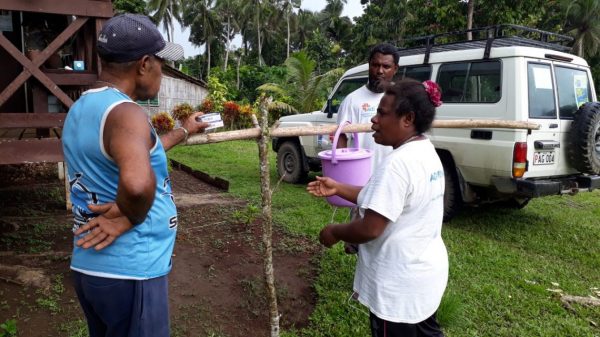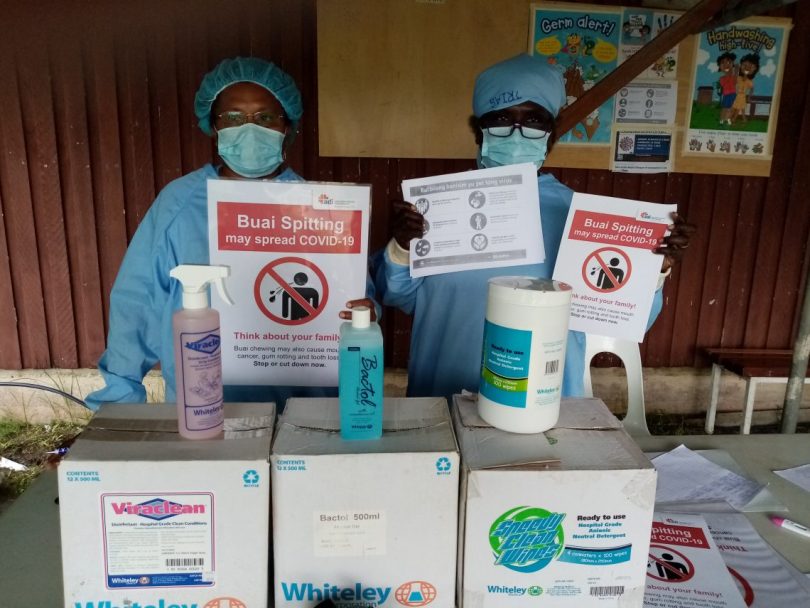In Papua New Guinea, the last few weeks have seen confirmed COVID-19 cases rise from one to eight (as of Friday, 1 May 2020). These cases are scattered across the country. Worryingly, three are in small villages in Western Province, which shares a porous border with Indonesia.
Health workers are very scarce (0.5 physicians per 10,000 population and 5.3 nurses per 10,000 population) and often overworked in PNG. There are no intensive care facilities in several provinces. While Australia reportedly has one ventilator per 11,000 people, PNG has one ventilator per 600,000. This is a country that already struggles with health issues – maternal mortality sits at 730 deaths per 100,000 live births (national estimate, 2006). The incidence of tuberculosis is among the highest in the world with 432 cases per 100,000 people. This epidemic, if it becomes widespread, is going to hit the PNG health system hard – both the network of rural health centres and aid posts, and provincial hospitals.

Small, nimble and networked NGOs can be some of the first and most effective responders. They can work with local health partners to produce and deliver WHO COVID-19 prevention posters in Tok Pisin; purchase and provide simple but lifesaving cakes of soap and buckets for health clinics who have none; and work with returned volunteer doctors to deliver webinars on preparing hospitals and health facilities for COVID-19 and managing extended use of personal protective equipment (PPE) for when it is scarce. These are just some examples of how Australian Doctors International (ADI), a small NGO, has adjusted regular programs to quickly meet the needs of the provinces we work in. Other NGOs working in PNG are undertaking similar activities.
Using technology to train remote health workers was previously viewed as not viable due to unreliable internet connections and perceived barriers to takeup. However, the webinars we initiated were well attended by health workers – many of whom were utilising this type of technology for the first time. We achieved connectivity through hot-spotting to mobile phone data from an ADI team member.
Globally, other organisations have found innovative ways to respond to COVID-19 remotely – from the use of drones to deliver medical supplies, to setting up nationwide toll-free hotlines to address COVID-19 related questions. This is a time to take on board such innovations.
ADI has been at the forefront of providing PPE into provincial hospitals. By the end of April, 240kg of PPE in nine shipments has been delivered to Kavieng, Kiunga, Rumginae and Kimbe. In the provinces where we work, ADI has joined the Provincial COVID-19 Taskforce and been asked to undertake specific public health education work.
The spirit and energy to collaborate to provide an effective response to COVID-19 in PNG among players as diverse as the mining sector, government, and NGOs is palpable. We had to withdraw all of our international staff in mid-March. But COVID-19 has also shown the value of having local actors and NGO staff on the ground to communicate with local governments and health authorities and respond promptly to rapidly changing situations in country.
It’s not just ADI. Sixty percent of government-funded Australian NGO Cooperation Program projects have ‘pivoted’ to assist low- and middle-income countries in our region to prepare for and respond to COVID-19. These projects cover a broad range of focus areas including health and hygiene promotion, prevention of gender-based violence, child protection, and health system capacity building.

NGOs must also consider how COVID-19 will impact the long-term health of communities and the health systems of the countries they work in. While high-income countries have postponed or canceled elective surgeries, for low-income countries, basic health services may be put on hold. Interruptions in vaccine delivery and contraceptives, difficulties accessing antenatal care, fear of seeking health care due to exposure to COVID-19, increased malnutrition due to lost income, and lockdowns will all exacerbate existing poor health outcomes. While NGOs offer support to COVID-19 responses, we must also consider how we can preserve the existing health system and workforce and ensure basic health services are provided now and in the future.
This is a time NGOs can collaborate as never before and support each other in undertaking innovative responses to flatten the COVID-19 curve of our nearest neighbours, and contribute to improving health within countries like PNG beyond the COVID-19 response.
This post is part of the #COVID-19 and the Pacific series.



Buai Spitting May spread COVID 19 Virus
Buai spitting is very questionable and before we add into our COVID 19 Messages, we must confirm as one of the medium of transmission of COVID 19. The reason why I am saying is that the poster shown in this blog written “Buai Spitting may spread the virus”. Are we really sure of it or just to raise fear into our people who chew and live with buai many thousand years. We need medical or scientific evidence to support the Phrase “BUAI SPITTING MAY SPREAD VIRUS (COVID19).
I have seen the poster and i asked myself why do we have to come up with such messaging and disseminate this information to our people only to create fear and once fear is instilled into them, the community members who grow Buai lost their income and surely it will affect their livelihoods.
Thanks